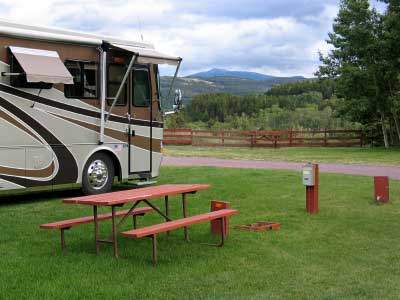OK. So you’re ready to get your RV out of storage. It’s been a long winter, a long year, a long time coming. But first things first, and there is a series of events that need to happen to ensure your RV is just as ready to hit the road as you are.
Inspect the Basic Mechanical Condition
First, take a peek under the hood. Even if you’re not a mechanic you should be able to spot a split or cracking hose, check the oil levels, and read any other dip sticks that need reading (transmission, power steering, etc). Should you have any concerns, or just want that added security have a mechanic peek at it as well. Most will be more than happy to give you an observation report for free. They can listen to the engine and tell you with their expert ear how it sounds. There’s nothing like peace of mind.
Next, take a look all around the RV. Check all the lights, brakes, awnings, porch lights, and other outside equipment. Is it still secure? Is it still working? Good. Also, take a look at those tires. How is the pressure? Again, any concerns here have them professionally checked. It’s quick and simple and could save you a blow-out experience down the road.
Now check the inside of the RV. Go retrieve all those batteries you, hopefully, stored away all winter in a clean, dry place. Make sure all batteries are in good shape and up for the journey. Now take a look around the cabin at things like the fire and carbon monoxide alarms. Test all appliances. Run faucets and look for any leaks. Also, check movement security features on all your cabinets and drawers.
If you’ve followed the above steps all that’s left to do now is planning and packing. As to the planning that, of course, depends on where you are headed. Keep in mind reservations may be a necessity – especially if you’re headed to a popular spot during the middle of summer. If you do make reservations make sure to confirm these well in advance and before you get on the road.
Pack Essentials and Have Insurance
As to the packing, that also depends on where you are headed, but there are some things you just shouldn’t leave home without: GPS for starters, clothes, books, food, computers and other devices, cameras, fishing gear and any other recreational equipment – these tend to be the bare necessities for most RVers these days. However, keep gas mileage in mind: the less you load the less you carry, the less you carry the less you will spend on gas.
A few further thoughts to consider is your RV insurance and roadside assistance. Are these up to date and do you have copies of all the information and cards you will need on the road? With this in mind make sure you check all your emergency equipment: your first aid kit, your spare tire(s) and flat tire changing equipment.
One more thing before you hit the road, you should always double check the security of your home and valuables before you leave and discontinue appropriate home services, such as mail, newspaper and cleaning services. To be extra certain and secure notify neighbors and local police of your travel dates.
Travel safe!

